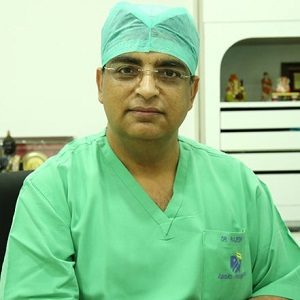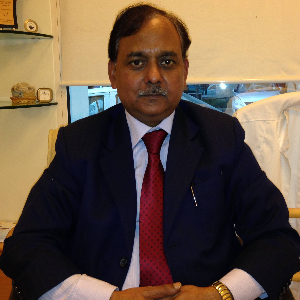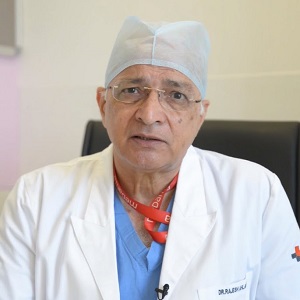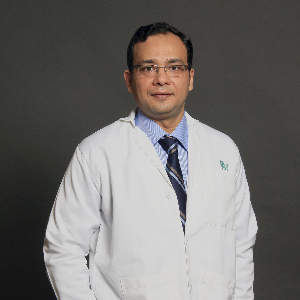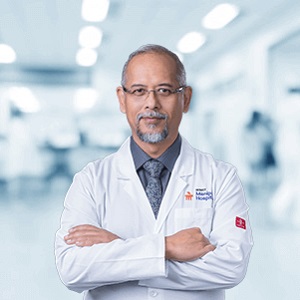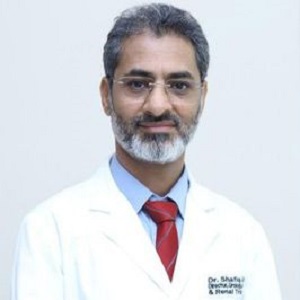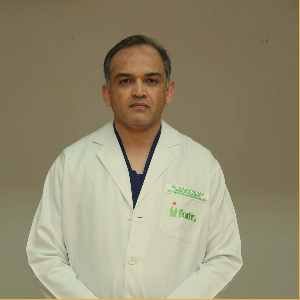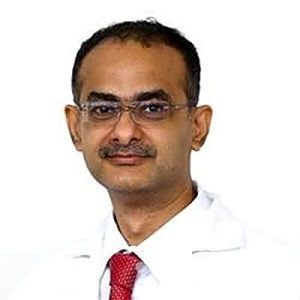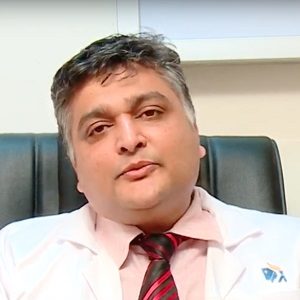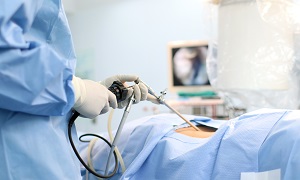Best Nephrectomy / Kidney Removal Surgery Doctors in India
- Top Robotic Urologist | Apollo Hospital, New Delhi, India
- 27+ Years Experience
- Indraprastha Apollo Hospital, New Delhi
Profile Highlights:
- Dr. Rajesh Taneja is celebrated as one of India’s foremost experts in robotic urology and andrology, currently practicing at Indraprastha Apollo Hospital in New Delhi.
- Renowned for his expertise in robotic-assisted urological surgeries, Dr. Taneja is among the select few urologists in the country performing these advanced procedures.
- His proficiency extends to Holmium Laser Enucleation of the prostate (HoLEP), where he has achieved exceptional outcomes.
- Trained in the Robotic Surgical system (Da Vinci Si), Dr. Taneja is recognized as a pioneer in robotic surgery, delivering results that meet global standards of excellence.
- Top Urologist | Max Hospital, Saket, New Delhi, India
- 35+ Years Experience
- Max Super Specialty Hospital, Saket, New Delhi
Profile Highlights:
- Dr. Anant Kumar is a distinguished figure in the field of Urology and Kidney Transplantation, boasting an impressive 35 years of experience. Currently serving as Chairman of Uro-Oncology, Robotic & Kidney Transplantation at Max Super Speciality Hospital in Saket, New Delhi, and Max Hospital Vaishali, he is celebrated as one of India’s top robotic and laparoscopic surgeons.
- Renowned for his expertise, Dr. Anant Kumar is widely recognized as the best urologist in Delhi and NCR. His specialties encompass Kidney Transplantation, Robotic Assisted Laparoscopic Urology, Urological Oncology, Laser Urological Surgery, and Reconstructive Urology.
- His reputation as a leader in urology is solidified by his extensive experience, having performed over 3,500 kidney transplants and more than 500 robotic surgeries in recent years.
- Top Uro - Oncologist | Max Hospital, Saket, New Delhi, India
- 22+ Years Experience
- Max Super Specialty Hospital, Saket, New Delhi
Profile Highlights:
- With an overall work experience of more than 22 years, Dr. Amit Goel is undoubtedly among the finest Uro-Oncologist in India who has been practicing at Max Super Speciality Hospital in New Delhi as the Director and Unit Head of Renal Transplant and Urology.
- He has extensive experience treating over 3500 cases of urological cancers and performing more than 400 kidney transplants, including both ABO-compatible and incompatible cases.
- Dr. Goel received his training in General Urology, Laparoscopic procedures, Endoscopic Surgeries, Renal Transplants, and Emergencies in Urology during his MCh residency.
- Urologist, Gurugram, India
- Over 40 years’ experience
- Medanta-The Medicity, Gurgaon
Profile Highlights:
- As the Group Chairman of Urology and Renal Care at Medanta The Medicity, Gurugram, Dr. Ahlawat continues to lead with unparalleled expertise, innovation, and dedication, furthering advancements in the field of urology and renal care.
- Dr. Rajesh Ahlawat is a preeminent figure in the realm of Minimally Invasive Urology and Renal Transplants, boasting over 39 years of distinguished experience.
- In addition to his clinical achievements, Dr. Ahlawat is a dedicated educator and academician. He has been involved in training future generations of urologists through M.Ch. and D.N.B. programs at the institutions he has been associated with.
- Top Urologist | Apollo Hospital, New Delhi, India
- 21+ Years Experience
- Indraprastha Apollo Hospital, New Delhi
Profile Highlights:
- Dr. Anshuman Agarwal is a highly esteemed Urologist with over 21 years of dedicated experience in the field, currently practicing at Apollo Hospitals Indraprastha in New Delhi.
- His academic foundation is robust, holding an MBBS, MS, and MCh in Urology, and he is an active member of both the Urological Society of India and the American Urological Association.
- In addition to his clinical practice, Dr. Agarwal has contributed significantly to academic and research endeavors.
- Urologist, New Delhi, India
- Over 25 years’ experience
- Manipal Hospitals, New Delhi
Profile Highlights:
- Dr. Sanjay Gogoi brings over 25 years of extensive experience in Comprehensive Urology Practice, specializing notably in renal transplantation.
- He is distinguished for his expertise in advanced transplant techniques including Laparoscopic and Robotic-Assisted procedures.
- Dr. Gogoi received specialized training in Robotic surgery at the da Vinci Training Center, Intuitive Surgical, California.
- With a track record spanning over six years in performing Robotic Cancer surgeries on various organs such as the Kidney, Bladder, Prostate, and Adrenal, he is renowned for his proficiency in Robotic reconstructive procedures for kidneys, ureters, and bladder, catering to both adult and pediatric patients.
- Director – Urology, Andrology & Renal Transplants | BLK Hospital, New Delhi, India
- 18+ Years Experience
- BLK Super Specialty Hospital, New Delhi
Profile Highlights:
- Dr. Shafiq Ahmed is a distinguished Urologist, Uro-Oncologist, and Robotic Kidney Transplant Surgeon, currently serving as the Director of Urology, Andrology & Renal Transplant at BLK-Max Super Speciality Hospital in New Delhi.
- With over 18 years of experience in the field, Dr. Ahmed has established himself as a leading authority in urology and renal sciences, having performed more than 15,000 urological procedures.
- Dr. Ahmed’s academic contributions are equally impressive such as MBBS, MS (General Surgery), DNB (Urology), MNAMS.
- Urologist, Gurugram, India
- Over 20 years’ experience
- Artemis Hospital, Gurgaon
Profile Highlights:
- Dr. Rajiv Yadav is a reputed urologist in India with great experience in Prostate, Kidney & Urinary bladder disorders.
- His clinical focus is on Robot-assisted Laparoscopic Surgery for Prostate Cancer, Kidney Cancer, and Urinary bladder cancers.
- He completed his training at the most prestigious institutes including AIIMS, Delhi & Weill Cornell Medical & New York-Presbyterian Hospital, USA.
- Urologist, Chennai, India
- Over 15 years’ experience
- Apollo Hospitals Greams Road
Profile Highlights:
- Dr. Deepak Raghavan is a renowned urologist who has gained immense fame and praise in the few years of his career.
- He is specially trained in Robotic Surgery, the need of the hour for Urology patients.
- Urologist, Chennai, India
- Over 21 years’ experience
- Apollo Hospitals Greams Road
Profile Highlights:
- Dr. Nitesh Jain is an experienced urologist in Tamil Nadu, having managed complex urological diseases.
- Dr. Nitesh has grabbed a gold medal in Surgery during MBBS and M.Ch Urology.
- Dr. Nitesh Jain also got training in robotic surgery from Roswell Park Cancer Institute, Buffalo, USA.
Best Nephrectomy Hospitals in India
- City: Gurugram, India
Hospital Highlights:
- One of India’s best and largest multi-specialty hospitals, Medanta was built with the aim to bring India to the highest standards of medical care. The hospital has been providing the best medical services to its patients, since its inception, with care, commitment, and compassion.
- Equipped with 1250 beds, the hospital was founded by Dr. Naresh Trehan in the year 2009 with an aim to provide the best medical care at affordable costs. The hospital is spread across 43 acres and includes 45 operation theatres and 350 beds dedicated solely to ICU. The hospital includes over 800 doctors, and more than 22 specialty departments and has a dedicated floor for individual specialty in order to offer the best services under one roof.
- The hospital is considered one of the premier institutes in India for Cardiac Care and includes staffs and members of high caliber. The hospital has 6 distinct centers of excellence.
- City: Gurugram, India
Hospital Highlights:
- Artemis Hospital, established in 2007 in Gurugram, India, is a leading multi-specialty institution known for its excellence in patient care and advanced medical technology, offering comprehensive services across specialties like Cardiology, Oncology, Neurology, Orthopedics etc.
- Renowned for its patient-focused care, Artemis Hospital combines state-of-the-art infrastructure with a team of internationally trained doctors and surgeons, ensuring the highest standards of medical treatment.
- Accredited by JCI and NABH, Artemis Hospital meets global healthcare quality and safety standards, reflecting its commitment to providing compassionate, personalized care.
- The hospital is recognized for utilizing cutting-edge diagnostic and ther*peutic techniques, ensuring patients receive accurate diagnoses and effective treatments tailored to their needs.
- City: Chennai, India
Hospital Highlights:
- The Apollo Proton Cancer Centre in Chennai is the most sought-after private cancer hospital in India. It is an integrated facility that provides cutting-edge, all inclusive cancer treatment to patients all over the globe.
- The hospital is a part of the renowned Apollo Group which has a large network of over 74 hospitals in India and across the globe. Out of the 74 hospitals, 21 of them are cancer centres. However, Apollo Proton Cancer Centre is the only cancer hospital to have JCI accreditation.
- The Centre, which was established on the principles of excellence and expertise, unites a formidable medical staff led by some of the most illustrious figures in cancer treatment.
- The hospital follows the global ASTRO Model Policy. It is the same global policy which is followed by countries like USA, UK, and Europe.
- Apollo Proton Cancer Centre is among the very few hospitals in India to receive patients from First World countries such as USA, Canada, New Zealand, Australia, Singapore, Thailand, etc.
- Apart from that, it is also the first hospital in Chennai to receive patients from several countries like Uzbekistan, Kazakhstan, Turkmenistan, Georgia, Armenia, Azerbaijan, SAARC countries (Bangladesh, Nepal, Sri Lanka, Maldives, Bhutan, Afghanistan, and Pakistan), South Africa, Turkey, Egypt, etc.
- In fact, there is a dedicated team at the Apollo Proton Cancer Centre that serves only international patients. Thus, on a monthly basis, the Centre receives patients from across 32 countries.
- Moreover, there are certain treatments in Apollo Proton Cancer Centre that are not available in any other centre. APCC addresses all types of possible cancers that are usually not covered by any other centre.
- City: New Delhi, India
Hospital Highlights:
- Over the last 33 years, the Fortis Escorts Heart Institute has set new standards in cardiac treatment with groundbreaking research. It is now known around the world as a centre of expertise for Cardiac Bypass Surgery, Interventional Cardiology, Non-invasive Cardiology, Paediatric Cardiology, and Paediatric Cardiac Surgery.
- The hospital has cutting-edge laboratories that perform a wide range of diagnostic tests in Nuclear Medicine, Radiology, Biochemistry, Haematology, Transfusion Medicine, and Microbiology.
- Fortis Escorts Heart Institute boasts a diverse group of bright and experienced doctors who are backed up by a team of highly qualified, experienced, and devoted support professionals as well as cutting-edge equipment such as the recently installed Dual CT Scan.
- Approximately 200 cardiac doctors and 1600 personnel currently collaborate to manage over 14,500 admissions and 7,200 emergency situations each year. The hospital now has a 310-bed infrastructure, as well as five cath labs and a slew of other world-class amenities.
- City: Gurugram, India
Hospital Highlights:
- Fortis Memorial Research Institute (FMRI) is a premier multi-super-specialty, quaternary care hospital, known for its exceptional international faculty, top-tier clinicians, super-sub-specialists, and specialized nurses, all supported by cutting-edge technology.
- It is the flaship hospital of Fortis Healthcare Limited, part of IHH Healthcare Berhad, a leading integrated healthcare services provider in India. As one of the country’s largest healthcare organizations, Fortis operates 28 healthcare facilities with over 4,500 operational beds (including O&M facilities) and more than 400 diagnostic centers (including joint ventures).
- Recognized as one of the top hospitals in India, FMRI serves as a leading referral center and aspires to be the ‘Mecca of Healthcare’ for India and beyond. Its 11-acre campus is a testament to its commitment to providing world-class healthcare.
- Accredited by JCI and NABH, FMRI is dedicated to maintaining the highest standards of healthcare quality and safety, ensuring that every patient receives the best possible care. The hospital’s reputation is further enhanced by its state-of-the-art facilities and innovative medical practices.
- City: New Delhi, India
Hospital Highlights:
- The Indian Spinal Injuries Center (ISIC), provides state-of-the-art facilities for the management of all types of spinal ailments.
- Staffed with internationally trained, acclaimed, and dedicated spine surgeons, the hospital provides cutting-edge medical & surgical technology. The hospital provides comprehensive management of spinal injury, back pain, spinal deformities, tumors, osteoporosis, etc.
- The hospital performs motion-preserving spine surgeries including disc replacement and dynamic fixation, and minimally invasive spine surgeries such as endoscopic disc excision.
- The orthopedic service of the hospital covers all orthopedic ailments including trauma, joint diseases & replacements, oncology, pediatric orthopedics & upper limb ailment.
- City: Faridabad
Hospital Highlights:
In the sprawling city of Faridabad, where healthcare needs are diverse and ever-evolving, one institution has consistently stood out as a beacon of excellence in the field of medicine—Marengo Asia Hospital. Established with a vision to provide world-class healthcare services to the community it serves, Marengo Asia Hospital has emerged as a trusted name synonymous with quality, compassion, and innovation in healthcare.
- City: New Delhi, India
Hospital Highlights:
- Indraprastha Apollo Hospital is a 700-bedded multispecialty hospital in the heart of the capital of India. It is a part of Apollo Hospital group, one of India’s most reputed healthcare chains. Indraprastha Apollo Hospital has been accredited by Joint Commission International, making it the first internationally accredited hospital in the country in 2005.
- There are 52 specialties in the hospital with one of the best cardiology centers in the country. The hospital is also equipped with State of the art infrastructure facilities with the largest Sleep Lab in Asia and the largest number of ICU bed facilities in India.
- The latest and highly advanced technologies that are installed in the hospital include Da Vinci Robotic Surgery System, PET-MR, PET-CT, Cobalt-based HDR, Brain Lab Navigation System, Tilting MRI, Portable CT scanner, 3 Tesla MRI, 128 Slice CT scanner, DSA Lab, Endosonography, Hyperbaric Chamber and Fibro scan.
- City: New Delhi, India
Hospital Highlights:
- One of the well-regarded providers in India committed to the highest standards of clinical excellence and patient care, Max Super Specialty Hospital is a part of Max Healthcare, which is the second-largest healthcare chain in India. Regarded as one of the most well-regarded healthcare providers in the country, Max Super Specialty Hospital is committed to the highest standards of clinical excellence as well as patient care. The hospital is also equipped with the latest technology as well as cutting-edge research. The hospital is known to deliver and ensure the highest level of patient care.
- The hospital has more than 500 beds and offers treatment for over 35 specialties. The hospital also holds the credit of having installed the first Brain Suite in Asia. This is a highly advanced Neurosurgical machine that allows MRI to be taken while surgery is ongoing.
- Other advanced and latest technologies are also installed in the hospital such as the 1.5 Tesla MRI machine, 64 Slice CT Angiography, 4D ECHO, LINAC, and 3.5T MRI machine.
- City: Kolkata, India
Hospital Highlights:
- Founded in 2017, the HCG EKO Cancer Centre is a committed, all-inclusive cancer care facility in Kolkata.
- The hospital was collaboratively established by India’s leading cancer care provider HCG (HealthCare Global Enterprises Ltd.), and EKO Diagnostic Pvt. Ltd., a top diagnostic and imaging chain in Eastern India.
- With 88 beds, the hospital provides a full spectrum of services including diagnosis, prevention, screening, second opinions, treatment, rehabilitation, follow-up, and palliative care.
- Additionally, the hospital contains a day-care chemotherapy ward, Neutropenic ward, medical ICU, pharmacy, blood bank, and an IPD wing.
- At HCG EKO Cancer Centre Kolkata, a large team of cancer experts with experience in medical oncology, surgical oncology, radiation oncology, hemato oncology, BMT, and nuclear medicine collaborate to offer a variety of treatment options under one roof.
- Furthermore, the hospital is also known for employing the most advanced radiation technology such as, the Radixact, a next-generation TomoTherapy equipment that provides greater radiation delivery precision.
Nephrectomy
Nephrectomy is a surgery that is performed to remove parts of or all of one of your kidneys. The kidneys are vital organs which filters water as well as waste products from your blood. They produce certain hormones as well.
A nephrectomy is done when the kidney is damaged, your kidney is no longer functioning properly, you are having kidney cancer or if you are donating your kidney. Doctors may remove the kidney through open surgery or laparoscopically. Laparoscopic surgery involves smaller incisions and its recovery time is quite faster. Usually, complete recovery from nephrectomy takes several weeks, and it can be sometimes very painful. Complications as well as infections are also possible, though the outlook is usually good.
Why it is done
Removing a kidney or part of a kidney is usually done for two reasons.
Damaged kidney: If your kidney is not functioning properly, it may require removal. If it gets damaged or scarred, it can be another reason for the removal. This might be due to disease, injury or infection. Sometimes a kidney is also removed due to cancer; however, if the tumor is small and detected early, only a part of it might need removing.
Donating Kidney: Sometimes, a person can donate their healthy kidney to someone, who requires a new kidney. Kidney transplants are usually more successful with kidneys from living donors rather than deceased donors.
Preparation
Before surgery, you will need to talk with your urological surgeon regarding the options which are available for you. You need to inquire whether you will need a partial or complete nephrectomy. You also need to ask whether you are a candidate for a minimally invasive procedure. You may also want to ask whether a complete nephrectomy is required or if a partial one is possible.
Depending on the type of procedure that will be performed, you might need to stay in the hospital from one night to a week or maybe more. Talk to your surgeon as well as your healthcare team regarding your probable recovery time.
On the day of and before the surgery, you will be given instructions regarding what you will need to do. You should ask your doctor any questions you might be having such as when you need to begin your fasting, whether you can prescription medications, etc.
Procedure
The procedure is performed with general anesthesia and you will receive it before the surgery so that you won’t feel any painful sensation during the procedure. You will also have a urinary catheter, a small tube that will be draining your urine from your bladder, placed before your surgery. The urological surgeon and anesthesia team work together to minimize the pain you feel after the surgery is done.
Depending on how the surgery is performed and how much of the kidney has been removed, the nephrectomy procedure can vary. The variations include:
Laparoscopic surgery
Robot-assisted laparoscopic surgery
Robot-assisted laparoscopic surgery is a variation of laparoscopic surgery, where the surgeon will be using a robotic system for performing the procedure. Robotic tools require very small incisions, as well as provide better 3-D images during the procedure and they can also make fine or complex motions similar to what a surgeon’s hand can do in open surgery.
Open surgery
Radical nephrectomy
In radical nephrectomy, the surgeon removes the whole kidney along with the fatty tissues around the kidney as well as a portion of the tube that connects the kidney to the bladder. The surgeon might remove the adrenal gland which sits atop the kidney if a tumor is close or involves the adrenal gland. Lymph nodes or other tissues are also removed in some cases.
Partial nephrectomy
In a partial nephrectomy which is also called kidney-sparing surgery, the surgeon removes a cancerous tumor or diseased tissue and leaves in as much healthy kidney tissue as they can.
Before your surgery, it is important that you discuss with your urological surgeon regarding the advantages and disadvantages of robotic or other types of minimally invasive surgery.
Risks
Though nephrectomy is generally safe like any other surgery, it carries a potential risk of complications such as infection, bleeding, injury to nearby organs and in rare cases, some other serious problems.
Overall kidney function decreases after nephrectomy, but the kidney tissue works well enough for the person to live a healthy life.
Long-term reduced kidney function can however lead to high blood pressure or chronic kidney disease. It is also important that you discuss with your surgeon, regarding these issues.
After the Procedure
Your recovery time will depend on the type of procedure that was performed as well as your overall health. The urinary catheter will remain in place during your recovery for some time.
Before you leave the hospital, you might be given a few instructions regarding your diet and other activities. For the first several weeks, it is important that you avoid any kind of strenuous activity or heavy lifting.
For the majority of patients, such procedures don’t affect their quality of life and they are able to return to their normal routine once they are fully recovered.
Though you will most likely be able to function well with one kidney, you should consider checkups to monitor a few factors which include:
- Blood pressure- Careful monitoring of your blood pressure is important as a decreased kidney function might lead to an increase in blood pressure, and high blood pressure can further damage the kidney.
- Protein urine levels- High protein urine levels (proteinuria) usually indicates kidney damage and/or poor kidney function.
- Waste filtration- Glomerular filtration rate measures how efficient your kidney is in filtering waste. The test is usually performed with a sample of blood for measuring the creatinine level. If the filtration rate is reduced, it is an indication of decreased kidney functions.

